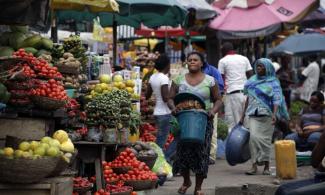
Findings by SaharaReporters in Ondo, Ekiti, Osun, Lagos, Abuja, and Port Harcourt, showed that the prices of staple food have increased by more than 90 per cent.
As prices of staple food hit the roof across the country, Nigerians are complaining that they can no longer afford balanced diets and regular meals for their families.
Findings by SaharaReporters in Ondo, Ekiti, Osun, Lagos, Abuja, and Port Harcourt, showed that the prices of staple food have increased by more than 90 per cent.

The prices of beans, rice, yam, garri, onions, tomatoes, pepper, fish, vegetable oil, palm oil, flour, and others have gone up beyond what many Nigerians say that they can afford.
Those who spoke to SaharaReporters pointed out that they had been struggling to feed since the coronavirus pandemic.
In Ondo State, for instance, a 'mudu' of local rice is sold at N850 while that of foreign is between N1000 and N1,200 with a bag going for N30,000 at the popular Oja Adedeji market in Akure.
At the Shasha market of the town, a rubber of white beans, which used to be sold at N18,000, is now N22, 000.
A schoolteacher, Bisi Ige, who is a mother of six children, said she could not afford to buy a bag of rice as she used to, due to the recent price hike.
"Before we used to buy a bag of rice which would last us for some time but now, we can't afford any longer. Even the bread that we depend on solely, its prices have increased," Ige, Akure resident, said.
"We have to resort to local rice," she continued. "My children have even abandoned the rice for yam, but it is still costly."
Tayo Adelaide, an Abuja resident, said the increase in the prices of staple food was an attempt to annihilate both the poor and vulnerable in the country.
"Just visit the Wuse market," Adelaide said. "You would notice that things are costly now. My wife used to buy bags of rice and half a bag of beans and garri in the house. But these days, we can't afford it any longer. Now, we only take home what we see and would eat, and this is frustrating and saddening".
A medical doctor in Osun State, Tunde Akinlaja, blamed traders for the skyrocketing food prices, adding that some of them are using the opportunities of the coronavirus pandemic to exploit Nigerians.
Similarly, Maxwell Ogene of Port Harcourt said many business owners indiscriminately increased the prices of food items.
He urged the government to come to the rescue of Nigerians by looking into the increase in the prices of essential commodities.
"We can't continue to blame our problems on inflation," he said. "Are we saying the increase in dollar rate is the reason why prices of yam and cassava flours were increased too?
"A farmer who planted cassava would also come to tell you that the dollar has increased, hence the reason why the paint or rubber of garri is costly. I feel we are just the problem to ourselves, and this is why we need to call the attention of our government to this. Nigerians are suffering."
An economist, Ayodeji Eniayewu, said the government should rise and address the yearnings of Nigerians over the cost of necessary commodities.
Eniayewu said that all the stakeholders in agriculture needed to come together and address the challenges of the hike in food prices, which is being attributed to COVID-19.
He explained that the surge in food prices might also threaten the nation's food security if the government decided not to intervene.
"If people said we should not blame the government for this, then who else should we blame and that is why we need those who understand how to run our economy in power,' he said.
"There are no clear-cut policies put in place by our government to assist citizens, and that is why people said we are being affected by the rise in dollar price. I know the statistics are there and we are running to another inflation that would also make things worse than the one we are currently experiencing."